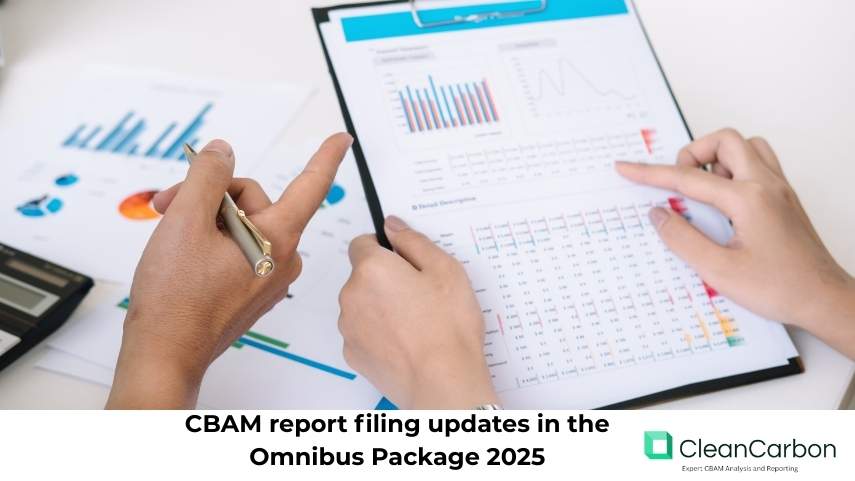For CBAM report filing, the European Union published its first Omnibus package on February 26, 2025. Out of various climate regulations, the two that got the most attention were Carbon Border Adjustment Mechanism (CBAM) and Corporate Sustainability Reporting Directive (CSRD). The Omnibus Package marks one of the first sets of changes the European Union makes to the regulations on sustainability reporting after the European Green Deal was enacted.
The reporting changes streamline compliance, making it more efficient and easier to understand. These changes are aimed to lower the administrative burden placed on businesses while increasing the effectiveness of sustainability disclosures. The goal of the package is to increase the competitiveness of the European Union in the climate economy by simplifying existing regulations pertaining to the climate.
As a result of the Omnibus Package, the global trade landscape will see some relief in the CBAM reporting filing and CSRD reporting compliances. For instance, while it will shift the balance of supply chains, it will not act as a barrier to trade flows as would have been the case with the earliest version of CBAM. Trade relations will become easier with the current configuration of the Omnibus package as it will adjust and standardize the regulations that govern sustainability reporting. A good example of this is the decrease in administrative burdens for importers and exporters.
Alterations regarding the CBAM report filing log under an omnibus package have been made.
Some left-shifting modifications have been made for EU declerants within the CBAM which will impact global trading regime. These modifications will provide some relief for 182 thousand SMEs in the Commission. Nonetheless, there is still over 99% of total emissions that is captured even after alterations are made in the CBAM rules. In aim of simplifying the CBAM, the EU has implemented some general measures for the remaining 90% of EU declarants as well as for suppliers around the globe. here are the particular ones for the importers under the CBAM.
- Set new thresholds with CBAM reporting
The European Union Commission has set a new de minimis limit in the report on CBAM for EU importers in relation to the EU importers. One of the documents being published in the Omnibus Package from EU states that any importer which is below the 50 tonne mark of any products under CBAM or below the 100 tonnes of CO2 per year gets a waiver from the obligations. 90% of the importers who are part of SMEs in in the Commission will be very happy about this.
- Deferral of CBAM Certification
The Commission has postponed the acquisition and surrender of CBAM certificates for distinct products from 2026 to January 2027. This represents a degree of ease for the declarants who were previously obliged to purchase the CBAM certificates as early as the onset of the definitive regime in January 2026.
- Changes to the Calculation Methods
The EU has indicated that it will also make changes to the declarant authorisation, emissions calculation, and management of CBAM’s financial liability.
- Prevention of CBAM Evasion Compliance Measures
With the new revisions, there will also be efforts towards enhanced and secure reporting integrity of the CBAM. For example, EU member state authorities will devise methods to stop suppliers and importers from evading compliance by circumvention.
- Elimination of Barriers to Inclusion of Additional Sectors to the Emission Trading System Under CBAM
The revised approach aims to extend the CBAM coverage to other sectors within the emissions trading system. Furthermore, the postponement of CBAM suggests a delay in the financial burden, as it will be gradually implemented on all products under the EU Emission Trading System.
The modifications implemented now intend to facilitate, if not ease, CBAM reporting for suppliers and importers alike. In any case, the Commission has said that there is no suggestion of a postponement in the achievement of CBAM, which is now in the Transitional Phase. Furthermore, the payment deferral for certificates does not erase the cost burden of carbon tax for the suppliers and importers. It merely delays the payment proportional to the emissions contained in the CBAM products.
Changes made in Omnibus package were equally done to CSRD.
The new rules that govern the Corporate Sustainability Reporting Directive will likely have relaxing scopes of compliance for about 80% of companies. Following these are some of the particular changes in CSRD reporting that were made:
Scope of companies expanded. After the recent changes made to the CSRD, the reporting rules extend only to big companies with above a thousand employees. In addition, any company with a turnover exceeding 50 million euros or with a total balance sheet value above 25 million euros will also be subject to CSRD reporting.
Reporting on an optional basis by firms not under CSRD jurisdiction It is possible for firms which do not fall under CSRD reporting scope and which have 1,000 employees to opt for voluntary reporting. That shall be carried out at the level of a simplified optional reporting template that shall be defined by the Commission.
Postponement of compliance with CSRD There is a postponement with the reporting obligation for the EU comission from 2026 and 2027 to the end of 2028. This is for firms that were before known to be subject for CSRD reporting. This deferment of CRSD reporting requirement has now been delayed by two years for its implementation.
Deletion of the reasonable assurance standard The latest alterations have deleted the reasonable assurance standard. The commission proposed moving from a quasi-assurance system to a reasonable assurance approach has been made. Deletion of the requirement of no sector specific standards The new regulation deletes the requirement of sector specific standard.
Revision of ESRS Also, the commission has reported to the parliament adopting a project on amending all the European Sustainability Reporting Standards (ESRS). He will amend the delegated act that established the new ESRS in order to reduce the big number of indicators. CBAM report filing CBAM report filing and CSRD reporting under Omnibus package.
In what ways does the Clean Carbon assist you in adapting to changes in CBAM and CSRD compliance?
With the ever changing climate policies across the globe, trade relations are tending towards ones more beneficial for companies who have climate action track records, or to nations devoid of stringent climate policies.
The Clean Carbon is constantly innovating, ensuring that every CBAM tool is capable of consolidating all reporting requirements in a timely manner to avoid costly compliance penalties. The platform also allows easy reporting of EU CSRD. The platform assists in gathering all relevant data needed to produce a comprehensive CSRD report for obligated firms.
Read Also: CBAM certificates : Process, Requirements & Benefits






